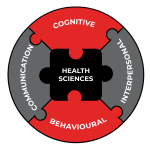5.4 Program: Dental Hygiene
Dental hygienists are preventive specialists who provide oral health services rooted in scientific knowledge and a client-centred model of care. It takes a specialized set of dynamic technical and interpersonal skills to clean teeth, take x-rays and promote oral health. If you’re looking for a rewarding career that makes a difference to people’s health and wellness, the Dental Hygiene program will give you reason to smile. (Fanshawe College, n.d.-c, para. 1)
Video: Dental Hygiene
Video: “Dental Hygiene” by Fanshawe College [1:06] Transcript Available.
About the Profession
A dental hygienist is a regulated health professional who works in a variety of settings, including private practice, public health, hospitals, long-term care facilities, educational institutions and research. They can work independent of or alongside a dentist and are an important part of your health care team (College of Dental Hygienists of Ontario, n.d., para. 1).
Professional Associations

College of Dental Hygienists of Ontario | L’Ordre des hygiénistes dentairs de l’Ontario
Ontario Dental Hygienists’ Association
The Canadian Dental Hygienists Association | L’Association Canadienne des Hygiénistes Dentaires
Places you might find yourself employed include
Private dental offices, independent dental hygiene practices, institutions (for example, hospitals, continuing care centres, correctional facilities), public health, community health, homecare and other outreach programs, the armed forces, government or regulatory bodies, research or consulting companies, dental insurance or supply companies, or post-secondary institutions.
Program Fit
What academic skills do I need to be successful in the program?
This program is very competitive; applicants will likely need some post-secondary experience to be competitive. The Pre-Health Science program is the recommended preparation for this program.
Literacy – Strong written and verbal communications skills are needed. High school courses in Business and Technological Communication would be good preparation.
Math & Science – Good math skills are needed (need a grade 11 or grade 12 math course). High school courses in Biology and Chemistry are required for this program.
Technology – Basic computer skills recommended (Microsoft Office suite, Internet, checking student portal daily).
This list does not replace the admission requirements you must have for admission to the program. Please see the Dental Hygiene program page for details.
What personal qualities should someone interested in this career have?
- Able to empathize with others
- Able to make decisions/problem solve quickly and confidently
- Able to cope in stressful situations
- Willing to handle situations involving blood and oral debris
- Strong attention to detail
- Flexibility – able to successfully adapt to changing situations
- Ability to accept & comply with professional standards
- Enjoy working with and caring for people
- Excellent communication and interpersonal skills
- Prepared to work with vulnerable people
- Strong organizational and time management skills
- Ability to work within tight timelines
Useful background experience for this program would be
- A part time job in customer service.
Typical working conditions for this kind of work:
- Work regular office hours but may work some evenings and weekends.
- Most clinical procedures require sitting, sometimes in uncomfortable positions.
- Dental hygienists must use safety glasses, masks, gloves, and proper sterilization and disinfection techniques to prevent the transmission of disease to themselves or their patients. Safety precautions also must be observed when taking x-rays and using certain chemicals.
- Dental hygienists may be required to lift young children into a dental chair or help transfer adults from wheelchairs into the dental chair.
- The most common occupational hazards are back, neck and shoulder problems, and carpal tunnel syndrome.
- Working in close proximity to members of the public.
Tasks a graduate may do in the workplace
- Assess oral health conditions
- Develop individualized treatment plans for clients
- Use pain management techniques
- Advise clients about oral health care and the link between oral diseases and systemic diseases
- Expose, develop and interpret x-rays for dental hygiene treatment
- Use fine motor skills in the use of delicate hand instruments and precision power instruments to provide clinical therapies such as crown and root debridement and oral prophylaxis (removing tooth surface deposits and stains) and other non-surgical therapies for periodontal disease
- Apply tooth cavity prevention and desensitizing agents
- Implement prevention programs
- Refer to other health care professionals as appropriate.
In community (public) health settings, dental hygienists may:
- Conduct needs assessments and surveys
- Implement preventive and health promotion programs
- Provide preventive therapies such as debridement and oral prophylaxis
- Apply tooth cavity prevention and desensitizing agents
- Counsel parents, students, seniors, and caregivers about oral health care
- Complete school oral health inspections and visit classrooms to explain the importance of oral hygiene and proper diet, and provide instruction in the care of teeth and gums
- Develop oral health policies for continuing care facilities
- Promote oral health for all age groups.
Becoming a Dental Hygienist
The Dental Hygienist program at Fanshawe College is a 6 term, 90 week Ontario College Advanced Diploma program starting in September each year. The program workload is considered to be heavy with:
- Seven courses in your first semester
- 1 – 2 hours of study/practice required for each hour in class
- 25-30 hours of class (50 -60 hour/week commitment)
The courses you would take at Fanshawe College can be found on the Dental Hygiene page.
Fanshawe Pathfinder: Dental Hygiene © Fanshawe College used with permission, All Rights Reserved
Video: Explore the new Oral Health Clinic at Fanshawe’s London Campus by Fanshawe College [0:51] Transcript available.
Admission Requirements:
Dental Hygiene Admission Requirements
In addition to earning a diploma or bachelor’s degree in dental hygiene from a college or university accredited by The Commission on Dental Accreditation of Canada, practising dental hygienists must be registered with the dental hygiene regulatory authority in their province or territory. Once registered and practising, most provinces and territories require dental hygienists to successfully complete a number of professional development initiatives each year. In Ontario a quality assurance program is mandatory.
Read more about Practising in Canada.
Career Options
For the most part, dental hygienists work within dental offices, cleaning teeth, checking for signs of decay and disease and managing oral health. While the services a dental hygienist can perform differ by province and territory, such as the ability to administer local anesthesia, all dental hygienists have the education and credentials to specialize in preventive oral care, but they are not limited to that only (Ontario Dental Hygienists’ Association, n.d., para. 12).
PHS Graduates:
Graduates of the PHS2 Pre Health Science – Pathways to Advanced Diplomas and Degrees with a minimum 3.0 GPA and a grade no lower than 3.0 in ANAT 1002, ANAT 1009, BIOL 1003 AND BIOL 1008 may apply for advanced standing in Anatomy and Physiology. Refer to program coordinator at start of program for eligibility.
Cathy DeVos
RDH, BAEd, MAEd (c)
| Current Employer | Fanshawe College |
| Skills you use professionally | Communication, problem-solving, time management, organization, empathy, independence, attention to detail, fine motor skills |
| Favourite thing about your job | Working with people and using my instrumentation skills to provide dental care. |
| Credentials/Past professional experiences | Currently working on my Masters of Adult Education
Worked in private practices both general and specialized |
| One thing I would tell my student self | Ask questions and get feedback; Get involved academically, socially, and professionally. |


